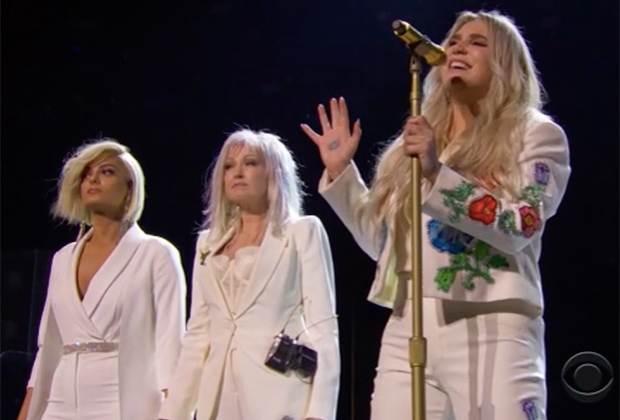2018 Grammy Awards Show Becomes A Platform for Political Activism; Prompts Controversy over Winners
Bebe Rexha (left) and Cyndi Lauper performed “Praying” with Kesha (right) at the 2018 Grammy Awards. Camila Cabello, Andra Day, and Julia Michaels also joined in on the performance.
The music industry’s most anticipated awards show, the Grammys, occurred Jan. 28 and proved to be interesting as ever. Bruno Mars was the most shocking winner of the night, taking home a whopping six awards. Three of those are the Grammys’ highest honors: Record of the Year, Song of the Year, and Album of the Year. Another big winner was Kendrick Lamar, who took home five awards. Meanwhile, Jay-Z, the most nominated person this year with eight nominations, received not a single Grammy.
This year’s Grammys had a slew of powerful performances. Song of the Year nominee “1-800-273-8255” by rapper Logic featuring Alessia Cara and Khalid is a song about an individual on the verge of suicide. The song’s title is the phone number for the National Suicide Prevention Lifeline, and a character in the song who is contemplating suicide calls the number and is able to persevere and find happiness in life.
Logic performed the song at the Grammys and brought suicide attempt survivors on stage with him. For the next two hours after his performance, calls to the Lifeline were triple the normal rate. The suicide prevention organization has praised Logic’s actions and message. OH sophomore Meer Hossain says, “I think it’s a good idea to talk about suicide at the Grammys; it’s important to raise awareness. A lot of singers have committed suicide over depression, so it’s definitely an important subject to talk about.”
Kesha also delivered an emotional rendition of her song “Praying.” The song references her legal battle with her former producer Dr. Luke, who she accused of abusing and sexually assaulting her. She was joined onstage by a crew of female artists: Cyndi Lauper, Camila Cabello, Andra Day, Julia Michaels, and Bebe Rexha. Singer and actor Janelle Monae introduced Kesha onstage and gave a passionate speech about the Time’s Up movement, rebuking sexual misconduct and gender inequality. She proclaimed, “We come in peace, but we mean business.” Lady Gaga spoke about the Me Too movement as well.
Further support for the Time’s Up movement was shown by countless stars, both males and females, wearing white roses to the Grammys. A group called Voices in Entertainment, led by prominent females in the music industry, organized the effort. They wrote in an open letter, “As we are inspired by the #timesup campaign, we are encouraging the artists that we work with and our colleagues … to wear a white rose to the ceremony. We choose the white rose because historically it stands for hope, peace, sympathy and resistance.” The Time’s Up campaign works to combat sexual assault and harassment in the entertainment industry and has set up a legal defense fund to help women in other industries.
The Grammys did not shy away from politics this year. During U2’s pre-recorded performance on a barge in front of the Statue of Liberty, Bono shouted, “Blessed are the s–thole countries, for they gave us the American Dream.” This is a reference to President Donald Trump’s alleged remarks that immigrants from Haiti and African nations are from “s–thole countries.” Logic also gave an empowering speech that championed women, people of color, and equality. He concluded, “To all the beautiful countries, filled with culture, diversity and thousands of years of history — you are not s–tholes! … Bring us your tired, your poor and any immigrant who seeks refuge, for together we can build not only a better country but a world that is destined to be united.”
Camila Cabello spoke about her experience as a Cuban immigrant and stressed the importance of protecting DACA’s Dreamers. “Tonight, in this room full of music’s dreamers, we remember that this country was made by dreamers, for dreamers, chasing the American dream. … And all I know is that just like dreams, these kids can’t be forgotten and are worth fighting for,” she asserted.
There was also an amusing skit regarding Fire and Fury, the controversial book about Trump. James Corden, who hosted the Grammys this year, had celebrities such as Cardi B, DJ Khaled, John Legend, and Hillary Clinton audition for the Best Spoken Word Album by reading excerpts from the book that clearly mocked peculiar habits of the President. The actual Grammy for Best Spoken Word Album went to the late Carrie Fisher for her book The Princess Diarist, a collection of memories from her days on the Star Wars set.
When asked whether she agreed with politics and anti-Trump sentiments being voiced at the Grammys, fellow OH student Alicia Coronho exclaimed, “I think there should’ve been even more! I think it should all be political.” Ashley Perry, on the other hand, says, “I think the Grammys should not be used as a platform to promote political views or opinions. I agree that there’s a lot of political turmoil going on, but I think the Grammys should be a time to enjoy music, not feel bad about society. I don’t like Trump, but I don’t want to be constantly reminded of how terrible our president is.” She did add, “I did think the Hillary sketch was very funny though.”
When the nominees for this year’s Grammys were announced, the nominations were decidedly more diverse in certain categories. The Verge noted, “‘Despacito’ became the first Spanish-language song to be nominated for Record of the Year and Song of the Year, every lead artist nominated for Record of the Year was a person of color, and the list for best Album of the Year did not contain a single white male artist for the first time in Grammy history.” Hip hop’s influence on popular culture was finally being recognized in the general categories, spreading beyond the Rap and R&B categories that it has traditionally been limited to.
These changes in nominations may be a result of a switch from paper ballots to online voting. The voting members for the Grammys consist of 13,000 songwriters, touring artists, and other music industry professionals. Digital voting is more convenient and accessible, meaning that more members will cast their votes and therefore express a greater variety of opinions. Voters can also listen to or watch the nominated recordings or videos on the same website, making for more informed voting.
Despite the positive change in voting, the more diverse nominees, and the empowering messages at the Grammys, the winners in the end were somewhat of a disappointment. Bruno Mars’ songs “24K Magic” and “That’s What I Like” won out over “Despacito” as both Song and Record of the Year. Luis Fonsi’s “Despacito” can easily be argued to have been the most popular song of 2017, not only in the United States, but internationally. One need only to look at its astounding statistics: it is the most viewed video ever on YouTube, with currently over 4.7 billion views. Variety’s Chris Willman says of the matter, “In shutting out the biggest global phenomenon of 2017, the Academy found an inadvertent way to alienate the pro-diversity bloc.”
Mars also beat other worthy nominations that were arguably more meaningful, such as Kendrick Lamar and Jay-Z’s politically and racially charged songs and Logic’s “1-800-273-8255.” Chris Payne from Billboard asserts, “Kendrick Lamar’s incendiary, socio-political opus lost to Bruno Mars’ radio-pleasing nostalgia joyride.” OH student Alicia Coronho claims, “Bruno Mars should not have won Song of the Year over Logic. It’s a good song, but it’s not better than “1-800,” and Logic’s music video was easily the best, too. Logic’s song spread suicide awareness. Bruno Mars’ song was about sex.” She also believes Lorde’s “Melodrama” or Childish Gambino’s “Awaken, My Love” would have been more deserving as Album of the Year.
There was a noticeable lack of female presence amongst the winners as well. Alessia Cara won Best New Artist, but she was the only female artist to be awarded during the entire televised broadcast. Lorde, the only woman nominated for Album of the Year, was not offered a platform to perform any of her songs. SZA was the most nominated woman with her five nominations, yet she did not win any of them. Cardi B’s explosively popular rap anthem “Bodak Yellow” did not win Best Rap Song or Performance. Ed Sheeran won Best Pop Vocal Album and Best Pop Solo Performance, two categories that had been dominated by women such as Kesha, Pink, and Lady Gaga. An OH student wishing to remain unnamed commented, “Kesha should’ve won at least one award. She was busy for five years with a sexual harassment lawsuit. Why is everyone forgetting that?”
Most disappointingly, comments were made after the ceremony by the Recording Academy’s president Neil Portnow that female artists need to “step up.” Variety had questioned Portnow on the lack of female winners. He responded, “It has to begin with…women who have the creativity in their hearts and souls, who want to be musicians, who want to be engineers, producers, and want to be part of the industry on the executive level. [They need] to step up because I think they would be welcome.” This caused an outcry, and over twenty prominent women in the music industry have formally called for his resignation.
It is clear that the Grammys have made an effort to progress recognition in the music industry, but there is still a long way to go towards proper representation. Artists such as Kanye West, Drake, Justin Bieber, and Frank Ocean have criticized and boycotted the awards show in recent years, and some even declined to submit their albums. Musicians and fans alike will be waiting to see whether these trends continue, or if next year’s Grammys can prove change is truly possible.









